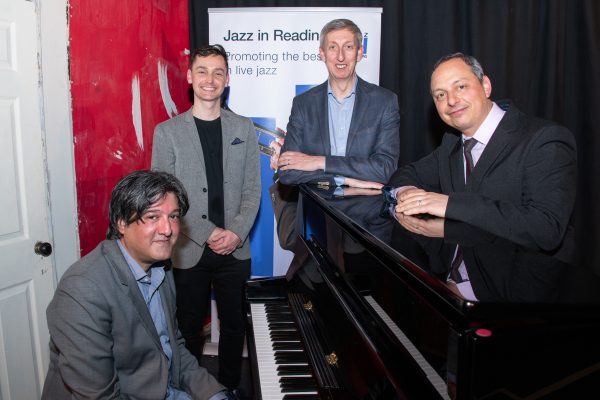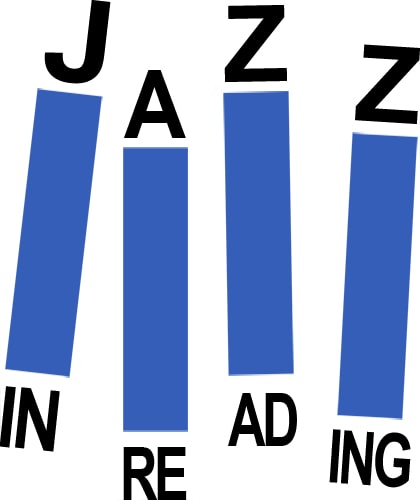Leon Greening Trio with Alex Garnett – April 2023

Progress Theatre, Reading, Friday 28 April
Leon Greening piano | Adam King bass | Steve Brown drums
Plus guest Alex Garnett alto saxophone
Leon Greening could have offered no finer memorial tribute to his late father, Alan, than his performance at the Progress Theatre on Friday 28 April. Emotionally charged with the grief of a loss suffered only twelve days prior to the concert, Leon raised his stellar talent to even greater heights for love of his ‘dear Dad’: the inspiration and guiding light for his career in jazz.
It was entirely appropriate that he should open the gig with his trio and one of his father’s favourite tunes, Bobby Timmons’ ‘This Here’. ‘Dad would play this on his turntable, ’Leon recalled, ‘and I would do my best to play along in unison with Bobby. Listening to that great music with my Dad was how I became a jazz musician.’
And what a jazz musician! All the hallmarks of Greening’s remarkable style were evident in this gospel soaked piece set in swinging 3/4 time; an irresistible mix of emotional power, knife-edge tension, unfailing invention and effervescent swing that sweeps you along in its wake. The contributions of bassist Adam King and drum ‘maestro’ Steve Brown ensured a matchless quality to the cohesion of the trio.
At this point Leon welcomed his ‘big brother’ and special guest to the stage in the person of the wonderful Alex Garnett, a world-class musician equally adept on any member of the saxophone family, but on this occasion playing alto. The blistering heat of ‘The Loop’, a composition by fellow altoist Vincent Herring, recalled Leon’s 2011 visit to New York along with Alex and Steve, when they played with Vincent on his home territory and recorded the album ‘Cookin’ in Brooklyn’.
Alto saxophonist and bandleader Julian ‘Cannonball’ Adderley was another favourite of Leon’s father and became an enduring influence in his own career. ‘Wabash’, from Cannonball’s 1959 album ‘The Cannonball Adderley Quintet in Chicago’ (in reality the Miles Davis working band of the day, including John Coltrane but minus Miles), bounced along with its delightfully melodic theme fused with a deep feeling for the blues. Adam King produced a standout solo on the bass accompanied by the hand-drumming of Steve Brown.
Billy Joel’s ‘52nd Street’ album bore homage to the 1.9 mile stretch of Midtown Manhattan roadway once known as ‘Swing Street’, where a proliferation of steamy basement jazz clubs played host to the giants of jazz – such legendary figures as Billie Holiday, Lester Young, Art Tatum and Charlie Parker – in the 1940s and 50s. Greening’s interpretation of ‘Rosalinda’s Eyes’, with Garnett’s searing alto to the fore, captured the free-wheeling, boundary pushing spirit of those now far-off days.
‘Hindsight’, a beautifully reflective piece composed by Cedar Walton – one of Greening’s latter-day heroes with whom he spent much treasured time in conversation – achieved a perfect balance between sound and emotion, which lingered in the mind long after the final notes had faded away. Superb!
An improvised foot-stomping, rip-roaring blues, with Greening’s two hands rolling the piano keys, brought the first set to a resounding close. He later dedicated the piece to everyone at Progress on that evening, under the title ‘Blues in Progress!’
On his return to the stage with his trio, Leon recounted how his father, who loved Bud Powell, had annotated an album of Bud’s music with a post-it note saying, ‘Bud Powell, the true genius of modern jazz piano’. As a young teenager Leon would sometimes be presented with a transcription of one of Bud’s solos which he would practice incessantly until he was note-perfect. ‘I wanted to play like Bud,’ he recalled, ‘and impress my Dad.’
One of those pieces, ‘Celia’ which Bud wrote in 1949 on the birth of his daughter, Leon now dedicated to his ‘darling Dad’. Taking a headlong plunge into Powell’s charming theme and with King and Brown in full support, Greening allowed his imagination free rein to build layer upon layer of the most white-knuckle improvisations you could possibly imagine. This was jaw-droppingly superb!
With scarcely a pause for breath, the trio now joined by Alex Garnett, launched into ‘If This Isn’t Love’ a flag-waving showstopper by Burton Lane and Yip Harburg which found fame in the musical ‘Finian’s Rainbow’. The subtle interplay between the musicians on this number was an absolute delight.
By contrast, Antonio Carlos Jobin’s ‘Corcovado (Quiet Nights of Quiet Stars)’ captured the unique quality of reflective nostalgia that is so often a feature of Brazilian music.
By way of a clue to the composer of the next piece, Leon struck the instantly recognisable opening notes to ‘Moanin’’. Of course … Bobby Timmons! He then explained how the next composition came about on the recording of Bobby’s 1966 ‘Soulman’ album. “The great Ron Carter, the bass player on the session, turned to Bobby after they’d finished recording an as yet untitled track and demanded to know what it was called. ‘Damned if I know’, came the reply.” In keeping with its title, the tune expresses a quizzical air of mystery. Alex Garnett added to the fun by dropping in a quote which kept me guessing where it was from until I returned home. A hasty scurry through Coltrane’s ‘Giant Steps’ revealed famous origin – the enchanting opening to ‘Syeeda’s Flute Song’.
Garnett’s impassioned alto was again to the fore in a swinging straight-ahead arrangement of Billy Joel’s ‘Zanzibar.
This object lesson in how to structure the dynamics of a piece and bring it to a perfect resolution – the closing notes gently distilling into the air, created exactly the right setting for Duke Ellington’s classic ballad ‘Prelude to a Kiss’, a further deeply felt tribute by Leon Greening to his late father.
An emotional and unforgettable evening of music came to a close with a funky portrayal of Leon’s favourite animal ‘The Leopard ’, a Greening original and a fitting final tribute to the father he loved so dearly.
On behalf of us all at Jazz in Reading we offer Leon and his family our deepest condolences on the death of his father Alan and thank him for so generously sharing his gift of music with us at such a difficult and sad time.
Leon, your Dad will be immensely proud of you and his spirit will remain with you through your music.
***
As ever, our thanks to the Progress front of house and lighting teams and a particular thank you to the audience whose magnificent support meant that we could hire a ‘real’ piano from Hickies of Friar Street for this special occasion.
Review posted here by kind permission of Trevor Bannister
Photo by Colin Swain
